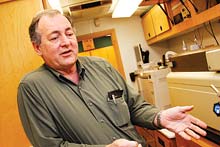EPA rolls in on the TAGA bus
When wildfires surged through Southern California, the U.S. Environmental Protection Agency was on the scene with a TAGA bus. Chemical fire? Monitoring fumigation used to dispel Anthrax? Analyzing toxic vapors in the subsurface? All jobs for the TAGA bus. Short for “trace atmospheric gas analyzer,” the $1 million piece of equipment can instantly detect harmful airborne chemicals in amounts as miniscule as parts per trillion. What looks like a typical bus on the outside is actually a mobile laboratory, with state-of-the-art equipment and a crew of top EPA chemists inside.

From Dec. 10 to 14, the TAGA bus rolled into the neighborhoods surrounding CTS of Asheville, a former industrial plant on Mills Gap Road listed as a hazardous-waste site due to groundwater contamination. Area residents—many of whom are initiating a lawsuit against CTS and other parties for a full-scale cleanup—fear that harmful vapors are seeping into their homes via contaminated groundwater. Trichloroethylene, an industrial solvent once used in factory operations, has been detected at high levels in the soil and groundwater beneath the old factory.
Using a series of methods, the TAGA-bus crew screened individual homes to determine whether there was an indoor buildup of trichloroethylene vapors or other hazardous airborne chemicals. “The primary objective is to determine whether or not there are exposures to vapor through groundwater,” explained EPA On-scene Coordinator David Dorian, who had traveled from Atlanta. The analysis can help the EPA piece together where the vapor is concentrated in the subsurface, he added, and provide a better idea of which households are at risk, which ones aren’t, and how far the contamination plume extends.
Although the TAGA-bus lab yields instant sampling results, Dorian was unable to release the data, which is considered preliminary by the EPA. In early February, he noted, all results from the soil-vapor analysis and well-water sampling will be shared with residents during a public meeting.
Deltec Homes goes solar
Yet another local business has opted to take advantage of free energy from the sun. Last week, “Green Scene” reported that 33 local Arby’s roast beef restaurants are going to be retrofitted with solar hot-water heaters; this week, we’ve learned that the largest private solar installation in the state is underway in Asheville.
Deltec Homes, a home-manufacturing company that specializes in circular abodes, has installed 273 photovoltaic panels at its 100,000 square-foot facility in West Asheville through a partnership with Sundance Power Systems, a local renewable-energy company. The panels, which each measure 56 by 39 by 1.4 inches, are capable of generating a total of up to 55 kilowatts, according to Deltec Homes Green Building Coordinator Steve Linton. “That is about one-third of the energy that we need to make the homes,” Linton explains. But the company is committed to using 100 percent clean energy in its manufacturing process, he adds, so they will purchase the additional two-thirds from the statewide NC GreenPower program. Linton says he expects the system to pay for itself in nine years, taking into account state and federal tax credits and the payments they’ll receive from Progress Energy for selling solar power to the grid. The facility’s conversion to 100 percent green power is expected to be complete by early 2008, and Linton says he hopes to expand the company’s solar-generating capacity over the next several years.
Joe Shlenck, director of sales and marketing for Deltec, says the solar-panel installation will reduce the company’s carbon-dioxide output by 208 tons annually (that’s the equivalent of 41 passenger cars not being driven for one year, according to an EPA-sponsored conversion system). Deltec ships its homes all over the country and occasionally throughout the world, says Schlenk. The round design, he adds, makes them stand out as more energy-efficient and hurricane-resistant than conventional homes. “We have always considered ourselves a very eco-friendly home manufacturer,” says Schlenk. “We don’t just want to get on the green bandwagon. We want to walk the walk.”



Man must feel the earth to know himself and recognize his values…. God made life simple. It is man who complicates it.